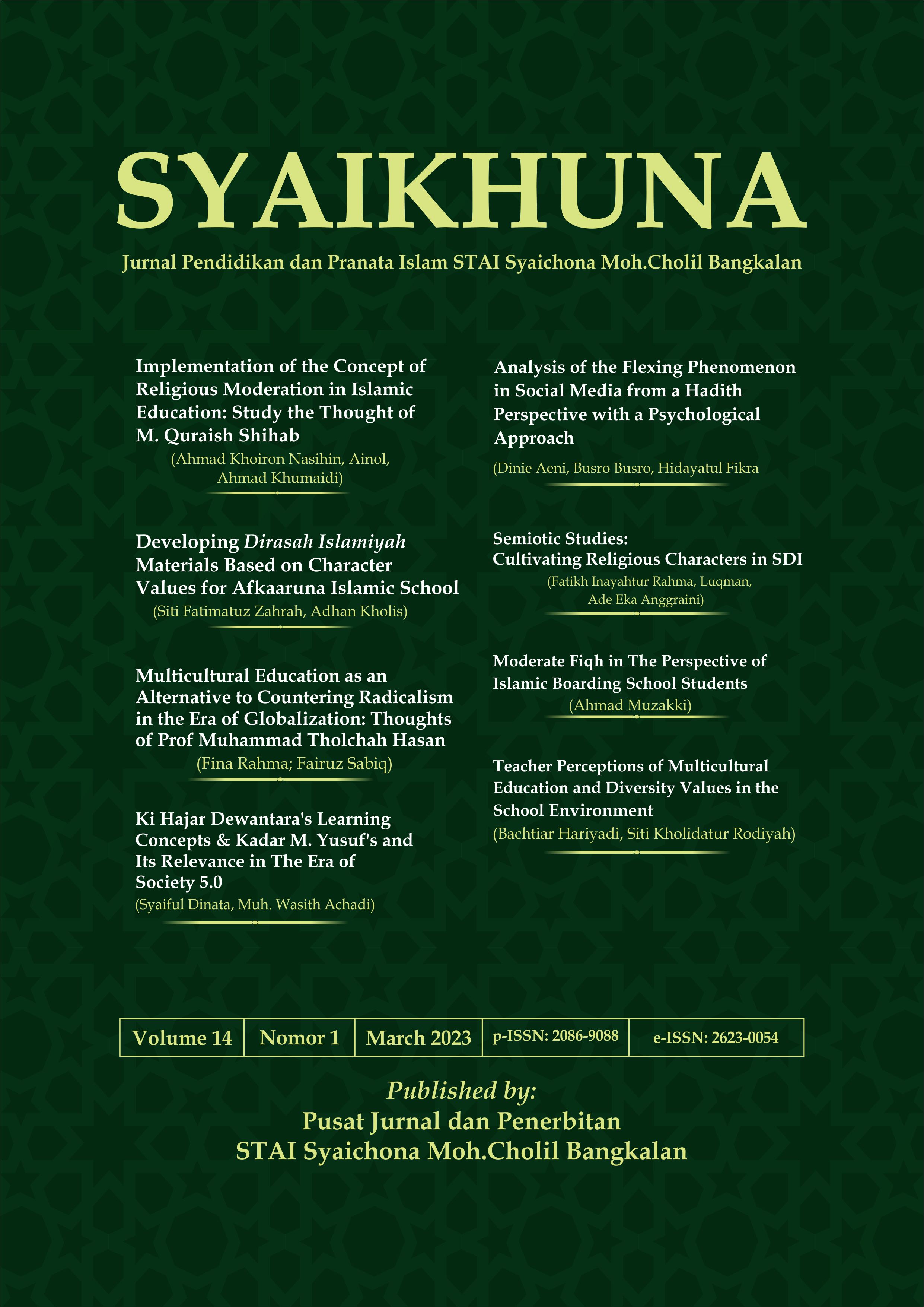Ki Hajar Dewantara's Learning Concepts & Kadar M. Yusuf's and Its Relevance in The Era of Society 5.0
DOI:
https://doi.org/10.58223/syaikhuna.v14i01.6445Keywords:
Concept, Study, Society, Ki Hajar Dewantara, Kadar M. YusufAbstract
Learning is a very important component of making humans truly human. Therefore, this study aims to analyze the learning concept of Ki Hajar Dewantara and Kadar M. Yusuf and its relevance in the era of society 5.0. In this study using the library research method, namely research that analyzes written literature in the form of books and scientific journals as the main source, the results of this study indicate that the concept of learning from the point of view of Ki Hajar Dewantara, namely learning is an activity that will provide knowledge and knowledge, thus obtaining safety. and the highest happiness. Whereas from the point of view of Kadar M. Yusuf said that learning is an activity that will produce knowledge and the concept of learning, Kadar M. Yusuf emphasized that learning includes all sensory aspects so that knowledge is obtained, awareness is formed, admiration is formed, and the final estuary is the formation vertical and horizontal piety. The two figures said that learning is all activity that will provide knowledge, and humans can form piety in themselves to achieve the highest safety and happiness. Therefore, the thoughts of Ki Hajar Dewantara and Kadar M. Yusuf regarding the concept of learning are very relevant in the era of society 5.0; this is because the two figures do not reject changes in the world of Education, as long as the activities carried out produce knowledge and knowledge. Furthermore, the existence of technology can facilitate the achievement of learning objectives because the media in learning is growing and not boring. The thoughts of the two figures are not only relevant in the era of society 5.0 but must be implemented and realized in order to provide a good filter for humans to enjoy the era of society 5.0References
Achadi, M. W. (2018). Pendidikan Islam Dalam Sistem Pendidikan Nasional. Al Ghazali, 1(2), 152–167.
Afendi, A. H. (2016). Al-Islam Studi Al-Qur’an (Kajian Tafsir Tarbawi). Deepublish.
Afif, N. (2019). Pengajaran dan pembelajaran di era digital. IQ (Ilmu Al-Qur’an): Jurnal Pendidikan Islam, 2(01), 117–129.
Ahmad, D. (1989). Marimba. Pengantar Filsafat Pendidikan Islam. Cet. VIII: Bandung: PT. Al-Ma‟ arif.
Ali, M. (2010). Reinvensi Pendidikan Muhammadiyah. Al-Wasat Publishing House.
Bungin, B. (2007). Penelitian kualitatif: komunikasi, ekonomi, kebijakan publik, dan ilmu sosial lainnya (Vol. 2). Kencana.
Darwis, A. (2020). Teknik Penulisan Skripsi Pendidikan Agama Islam. Pekanbaru: Cahaya Firdaus.
Dewantara, B. S. (1989). 100 Tahun Ki Hajar Dewantara. Pustaka Kartini.
Dewantara, K. H. (1977). Bagian pertama pendidikan. Yogyakarta: Majelis Luhur Persatuan Taman Siswa, 1, 215.
Dimyati, M. (2006). Belajar dan pembelajaran. Jakarta: Rineka Cipta.
Hadjar Dewantara, K. (2010). Menuju Manusia Merdeka. Jakarta: Leutika Books.
Harahap, H., & Dewantara, B. S. (1980). Ki Hajar Dewantara dan kawan-kawan, ditangkap, dipenjarakan dan diasingkan. Gunung Agung.
Hariadi, K. (n.d.). Sugiono.(1989). Ki Hajar Dewantara Dalam Pandangan Cantrik Dan Mancantriknya. Yogyakarta: Majelis Luhur Persatuan Taman Siswa.
Hariyadi, K. (1989). Ki Hadjar Dewantara sebagai Pendidik, Budayawan, Pemimpin Rakyat, dalam Buku Ki Hadjar Dewantara dalam Pandangan Para Cantrik dan Mentriknya. Yogyakarta: MLTS.
Harun, S. (2022). Pembelajaran Di Era 5.0. Prosiding Seminar Nasional Pendidikan Dasar.
Kadar, M. Y. (2015). Kontruksi Ilmu Dan Pendidikan, Menelusuri, Ontologi, Epistimologi, Dan Aksiologi Qur’ani. Jakarta: Amzah.
Kadar M. Yusuf. (2019). Konstruksi Teori Belajar Qur’ani. Literasi Nusantara.
Miarso, Y. (2004). Menyemai benih teknologi pendidikan. Kencana.
NURHIKMAH, I. (2022). KONSEP BELAJAR DALAM AL-QUR’AN PERSPEKTIF KADAR M. YUSUF DALAM BUKU KONSTRUKSI TEORI BELAJAR QUR’ANI. Universitas Islam Negeri Sultan Syarif Kasim Riau.
Rahardjo, S., & Ki, B. S. (2009). Hajar Dewantara, 1889-1959. Yogyakarta: Garasi.
Sangadji, E. M., & Sopiah, S. (2010). Metodologi Penelitian Pendekatan Praktis dalam Penelitian. Yogyakarta: CV Andi Offset.
Soeratman, D. (1989). Ki Hajar Dewantara. Departemen Pendidikan dan Kebudayaan, Direktorat Sejarah dan Nilai ….
Sukmadinata, N. S. (2007). Metodologi penelitian pendidikan. Bandung: Remaja Rosda Karya.
Teknowijoyo, F., & Marpelina, L. (2021). Relevansi Industri 4.0 dan Society 5.0 Terhadap Pendidikan Di Indonesia. Educatio, 16(2), 173–184.
Thohir, M. M. Bin. (2021). Kepemimpinan Ki Hadjar Dewantara dalam Manajemen Dakwah. Dakwatuna: Jurnal Dakwah Dan Komunikasi Islam, 7(2), 367–392.
Yanuarti, E. (2017). Pemikiran pendidikan ki. Hajar dewantara dan relevansinya dengan kurikulum 13. Jurnal Penelitian, 11(2), 237–265.
Yuberti, Y. (2015). Peran teknologi pendidikan Islam pada era global. AKADEMIKA: Jurnal Pemikiran Islam, 20(1), 137–148.
Yusuf, K. M. (2021). Tafsir Tarbawi: pesan-pesan Al-Qur’an tentang pendidikan. Amzah.
Zahara, I. (1981). Dasar-dasar pendidikan. Surabaya: Usaha National.
Zed, M. (2004). Metode peneletian kepustakaan. Yayasan Obor Indonesia.
Downloads
Published
How to Cite
Issue
Section
License
Copyright (c) 2023 Syaiful Dinata, Muh. Wasith Achadi

This work is licensed under a Creative Commons Attribution 4.0 International License.





